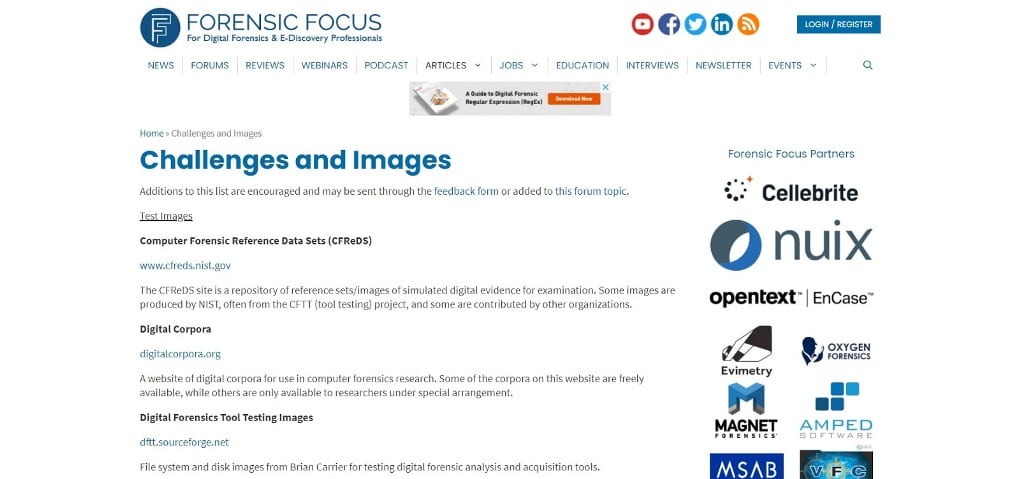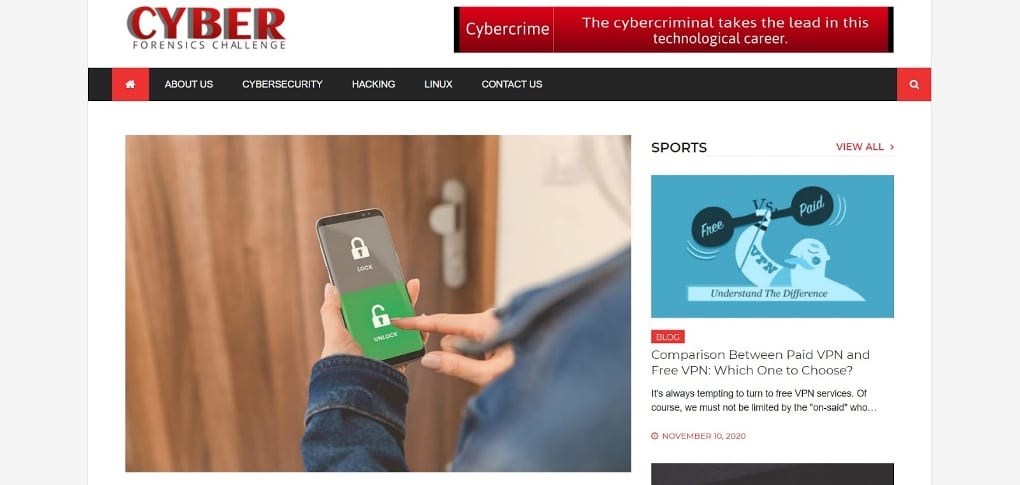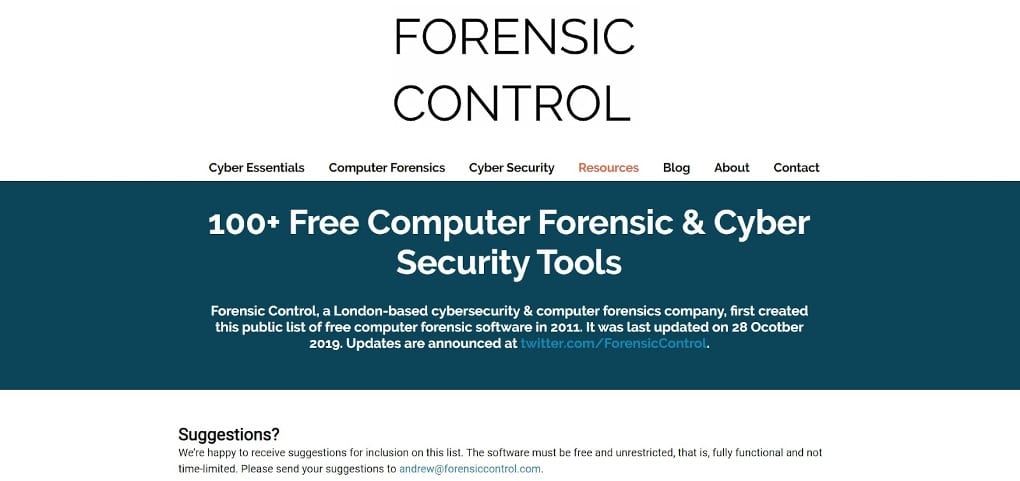Much like a detective searching for clues and fingerprints, computer forensics specialists will collate evidence and digital fingerprints. A computer forensics investigator is not to be confused with an IT technician. It is more similar to cyber security studies that involve elements of criminal justice studies.
Computer forensics investigators undergo years of training and development, as deciphering binary codes and computer metadata is almost as complicated as understanding human DNA. Explore more information and computer forensic courses below to learn how you can become the Sherlock Holmes of computers.
What Is Computer Forensics?
Computer forensics is the process of identifying, preserving, extracting, and documenting computer evidence after a digital crime has occurred. Experts extract evidence from devices like computers, mobile phones, servers, or computer networks. A computer forensics expert aims to solve crimes like cyberstalking, cyber terrorism, data breaches, information theft, and human exploitation.
Historically, Hans Gross, the Austrian “Founding Father” of criminal profiling, was the first to use scientific forensic study in a criminal investigation in 1847. He used forensics in the traditional sense, to collect evidence of a real-life crime. In contrast, the term computer forensics was first officially used in academic literature in 1992.
Types of Computer Forensics
There are many different types of computer forensics, as it is a broad field. Take a look at our list to see the different types and how they relate to various criminal activities.
- Network forensics. This area is related to security and law enforcement and involves observing a network for unusual traffic and identifying intrusions. If an attacker erases all log files, network-based evidence will be the only possibility for forensic analysis.
- Disk forensics. This is the extraction of forensic information from storage media like hard disks, FireWire devices, USB devices, DVDs, CDs, and flash drives.
- Wireless forensics. This involves capturing data as it moves over a network and finding the source of the illegal security attacks.
- Database forensics. Database forensics is related to the examination of databases and metadata. It involves investigating the timestamps on a database to verify the actions of the user.
- Email forensics. This deals with the recovery and analysis of emails, including deleted emails, email senders, calendars, time stamps, and contacts. It is most often used in investigations of email death threats and other email-related crimes.
- Memory forensics. This deals with collecting data from the memory (system registers, cache, or RAM) of a computer. Its primary application is for advanced computer attacks that don’t leave data on the hard drive.
- Malware forensics. This branch of forensics aims to identify malicious code. It also consists of examining viruses, payloads, and worms to discover how to stop malware from attacking phones and computers.
- Mobile phone forensics. This is the analysis of mobile devices to discover threats. Attackers often gain access to call logs, SIM contacts, text messages, audio files, and videos through phones.
Computer Forensics Skills
This type of digital criminal justice requires a broad range of skills and computing knowledge. If you are interested in becoming a computer forensics analyst, you will need to have the skills listed below.
File Formats
Firstly, understanding the different file formats is essential. A file format is a common way of encoding and storing information. Some examples of file formats include PDF documents, JPEG images, and MP4 videos. Knowing how these formats work and how to gather relevant information from them is vital for cybersecurity.
Software Drivers
A software driver provides a programming interface to manage another interface that is linked to a particular type of hardware. There is also a specific subclass of drivers that control the physical or virtual hardware devices.
Networking
Computer networking is when computers are linked by cables, Wi-Fi, and satellite. You must know about networking so you can understand how an attacker might choose to access a network.
Cryptology
Applications of cryptography include digital currencies (like Bitcoin) electronic commerce, chip-based payment cards, computer passwords, and military communications. Before the modern age, cryptography was synonymous with encryption, or, converting information from a readable language to a specific code.
Ethical Hacking
Ethical hacking, also known as white-hat hacking, plays a large role in cyber security. A certified ethical hacker will discover weak points in a company’s system. They are considered legal hackers, known for preventing malicious hackers from stealing money or data.
Investigation Techniques
A computer forensics expert’s investigation begins by accessing the situation under investigation, acquiring and preserving the data evidence, analyzing the evidence, and creating a report of the case. It can be summarized in these four points:
- Access
- Acquire
- Analyze
- Report
Computer Forensics Tools
Computer forensics is constantly evolving as computers become more advanced. The tools used by a computer forensics examiner have changed over time. However, here are five of the most popular computer forensics tools.
- SANS SIFT
- ProDiscover Forensic
- Volatility Framework
- The Sleuth Kit (+Autopsy)
- CAINE
Learning Computer Forensics
Although a college degree is not a requirement, earning a certificate or attending a degree program for computer forensics, criminal justice, or computer science may help you reach your computer forensics career goals quicker.
According to the US Bureau of Labor Statistics, certificates and degree programs might be the best path to becoming a computer forensics technician, as strong computer and investigative skills are needed to become a professional in the field.
A certificate program is ideal if you already have a job in law enforcement, or a bachelor’s degree in a related field. Associated areas include computer science, criminal justice, and computer forensics.
How to Learn Computer Forensics: Step-by-Step
There is so much to learn to make sure you are equipped to handle digital forensic investigations. There is no one-size-fits-all approach to becoming a computer forensics specialist. However, there are basic steps you should follow to get started.
- Digital literacy. If you are starting with zero computer knowledge, it would be wise to begin with digital literacy. Slowly work your way through different operating systems and applications until you are comfortable enough to start learning coding languages. You may even choose to attend a coding Bootcamp to boost your knowledge in a short time period.
- Computer forensics education. Whether you decide to go the self-taught route or attend a four-year degree program, it is important to learn everything you can in all fields relevant to digital forensics. These areas include computer science, coding, ethical hacking, criminal investigations, operating systems, network security, criminal justice, and digital evidence recovery. You will need to obtain multiple certifications before you will be able to land a job, which brings us to the next step.
- Network defender certification. At this point, you will need to understand network components like network traffic, network topology, network security controls, protocols, IDS, VPN, and firewall configuration. Then, you can get a valid certification.
- Ethical hacker certification. After learning about network security, it is time to put your white hat on. You will begin to learn about network scanning, footprinting, and Trojan analysis as you get a better understanding of how a hacker thinks so that you can stop them effectively.
Best Computer Forensics Courses and Training

Below, we have compiled some of the very best computer forensics courses for you to consider. This includes some in-person classes, as well as free and paid online courses.
Best In-Person Computer Forensics Courses
Since the outset of the pandemic, it has become more challenging to find in-person courses. Still, we have selected two of the digital forensics top programs for your consideration.
Champlain College
- Computer Forensics & Digital Investigations
- Where: Burlington, Vermont, or online
- Time: Four years
- Prerequisites: Unknown
- Price: $318 per credit
Although this is a degree program, it is noteworthy because Champlain College is associated with the Department of Homeland Security and the National Security Agency. This extensive program teaches students everything they need to know to begin working for a government agency.
University of Central Florida
- Master of Science in Digital Forensics
- Where: Orlando, Florida, or online
- Time: Two years
- Prerequisites: Bachelor’s degree in a related field
- Price: $369.65 per credit hour
UCF’s master’s program will prepare students in digital forensics examination, forensic tool development, tool verification, security, and forensics administration. This program will also help students prepare for essential exams like the GIAC Security Essentials, CompTIA A+, and CompTIA Network+.
Best Online Computer Forensics Courses
Below are some of the paid online courses that will help increase your knowledge. These are perfect for beginners or intermediate-level professionals who have some extra cash.
LinkedIn Learning
Learning Cloud Computing: Core Concepts
- Where: Online
- Time: 1 to 3 hours
- Prerequisites:
- Price: Varies (First month free)
These are great courses to help you start learning about computer forensics, as they cover all the basics. It will teach you about the goals of computer forensics, the types of investigations, and the various career specializations. Students will also learn how to acquire, preserve, and analyze data.
CompTIA

"Career Karma entered my life when I needed it most and quickly helped me match with a bootcamp. Two months after graduating, I found my dream job that aligned with my values and goals in life!"
Venus, Software Engineer at Rockbot
- Where: Online
- Time: Varies
- Prerequisites: Varies
- Price: $226 – $899
These courses are fabulous for students who want certifications in security, networks, or ethical hacking. Keep in mind that you should complete the first three courses before attempting the PenTest course. These highly professional certificates are great for ethical hackers and aspiring computer forensics experts.
EC Council
Certified Threat Intelligence Analyst (C|TIA)
- Where: Live online, or in-person
- Time: 40 hours
- Prerequisites: Must be an IT professional
- Price: Varies
The EC Council offers brilliant online training for almost any cyber security career path. Students can choose whether they want to become a certified ethical hacker or get a specific hacking for forensics certification.
Best Free Computer Forensics Courses
Lastly, let’s look at some of the free computer forensics courses. These are great beginner courses that will provide you with foundational knowledge so you can see if computer forensics is right for you.
Udemy
- Become Computer Forensics Expert
- Where: Online
- Time: 7 Days
- Prerequisites: None
- Price: Free
In this Udemy course, students will learn how to handle a crime scene. The introduction to computer forensics covers data analysis and maintenance, data integrity, hashing, and how to acquire disk images.
Khan Academy
College Computer Science Principles
- Where: Online
- Time: Varies
- Prerequisites: None
- Price: Free
This innovative class is from the non-profit institution Khan Academy, which offers many free tutorials. The classes listed above are wonderful for beginners who want to learn computer science, digital information, security, and programming languages.
Best Computer Forensics Books
Let’s look at a few of the most popular books on digital forensics that would be great to read alongside your course studies.
Computer Forensics For Dummies, Reynaldo Anzaldua & Carol Pollard
In Anzaldua and Pollard’s book, you will learn all about email and web-based forensics. It also covers mobile forensics, encryption, passwords, and other e-evidence. The authors will then guide you through the intricacies of VoIP, legacy mainframes, voicemail, and databases.
Incident Response & Computer Forensics, Jason T. Luttgens
This practical book covers the entire process of incident response, including preparation, data collection, data analysis, and remediation. Luttgens reviews real-world case studies and reveals the strategies used to handle today’s most stealthy attacks.
The Art of Memory Forensics, Michael Hale Ligh et al
This is the follow-up to the author’s bestseller, Malware Analyst’s Cookbook. Flip through this guide to memory forensics written by an expert in malware, security, and digital forensics. This book will help you in detecting malware and threats in Windows, Linux, and Mac.
Best Online Computer Forensics Resources
As we all know, there are some fantastic tools and resources available on the Internet. They are perfect as a reference both during and after your studies, as there is always more to learn in this ever-evolving career. Below are some websites that offer sources of inspiration and free toolkits.
Forensicfocus.com

Forensic Focus creates digital forensics contests to help beginners and practitioners hone their skills while having fun. Many of the challenges mimic real-world investigations and include evidence files that you must analyze using forensic tools.
Cyberforensicschallenge.com

Similar to Forensic Focus, Cyber Forensics Challenge provides problems for students to solve. It is another excellent resource for those who want to test their skills.
Forensiccontrol.com

Finally, every aspiring computer forensic expert needs a great toolkit for learning and work.
Check out Forensic Control’s list of free computer forensics tools, which is regularly updated.
Should You Study Computer Forensics?
Even taking a short computer forensics course will help you get an idea of whether you have what it takes to become a cyber detective. If the idea of examining detailed evidence on a computer and trying to understand cyber attackers sounds fascinating, then computer forensics may be for you.
Learning how a hacker thinks, and how to navigate and protect computer systems, is the key to digital forensics. As stated by the US Bureau of Labor Statistics, an information security analyst can earn a median salary of $99,730 per year, so the career is a worthwhile pursuit.
If you want to learn more about related fields, check out our article on computer science scholarships. We hope this guide to computer forensics courses and training has helped you find a path that will help you get started learning.
About us: Career Karma is a platform designed to help job seekers find, research, and connect with job training programs to advance their careers. Learn about the CK publication.
